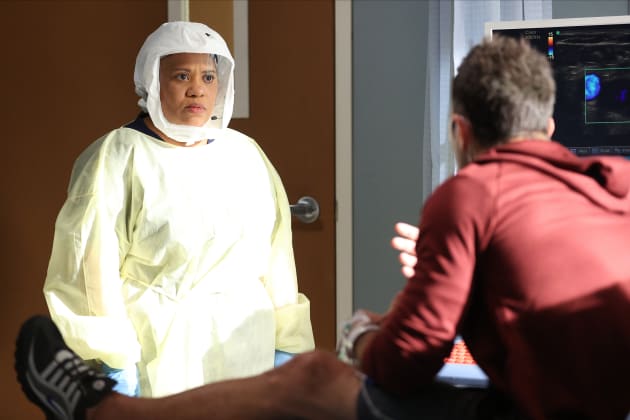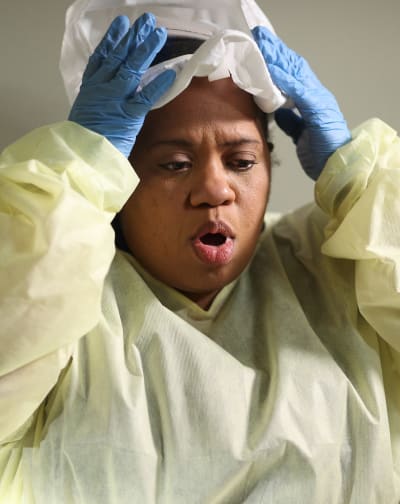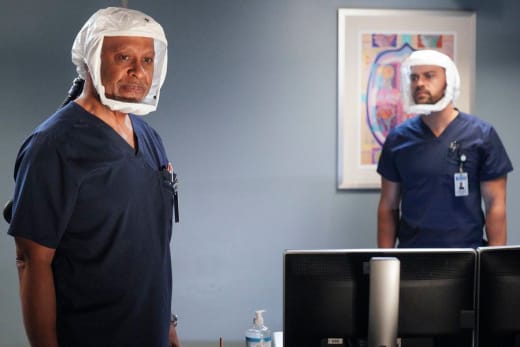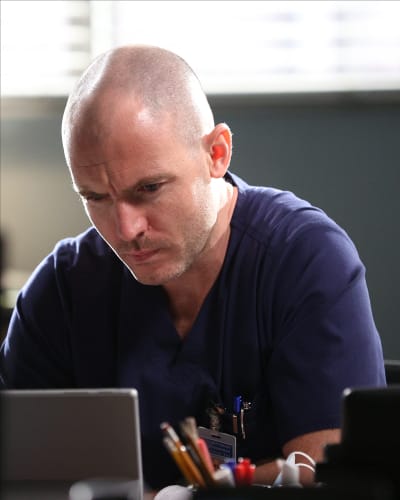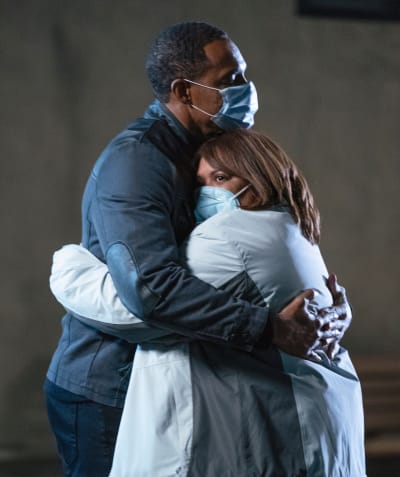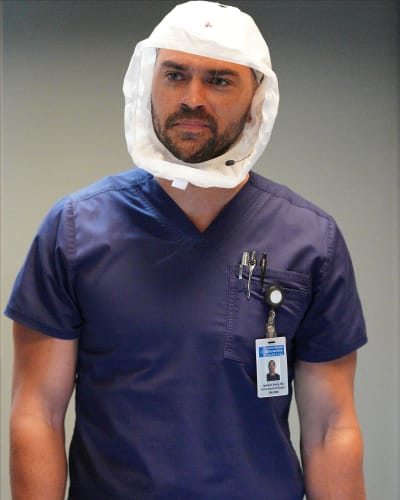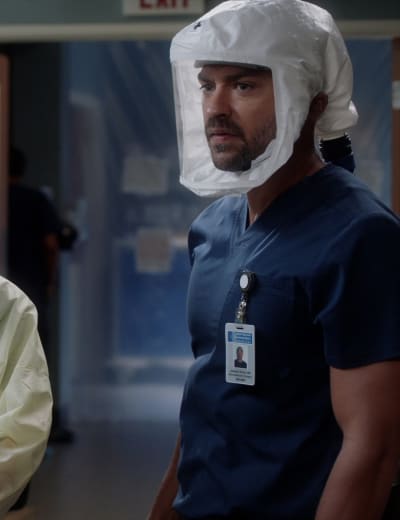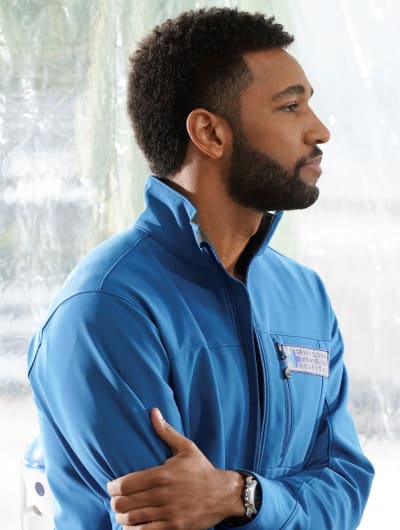Winston had a traumatizing experience, Jackson got inspired, Mer didn’t wake up, and Bailey had to deal with a COVID denier who eventually passed away from, you guessed it, COVID.
Evidently, Grey’s Anatomy Season 17 Episode 12 was the series’ acknowledgment of George Floyd’s death and the social justice uprising it sparked.
They tried to deliver an installment that captured racism and the systemic trauma that a collective experiences every single time a horrific event like Floyd’s death happens.
By a twist of fate, the installment falls within the second week of Derek Chauvin’s trial and on the heels of at least four or five fatal shootings by police and another disturbing and highly publicized traffic stop that didn’t end in death.
To say it’s topical is an understatement, and Grey’s is in a long line of series that have tackled the explosion of race conversations that have taken place since Floyd’s death.
Maybe it was too topical for the series to make this attempt, coming off of another onslaught of police-sanctioned deaths of unarmed citizens, tuning in to a series seemingly phoning it in with their obligatory Floyd/BLM-inspired Race/Police Brutality episode didn’t make for a fun hour.
And that’s fine; there isn’t anything “fun” about this, but it also wasn’t a thought-provoking, or informative, or visceral hour either, and if you want to touch upon such trauma, pain, fear, and the insidious effects of racism, you damn well have to commit to it.
You either go big or go home.
You either ruffle feathers and shake the table or not. You don’t rest on your laurels. You dedicate the hour to the topic at hand.
We got an entire installment devoted to Teddy’s PTSD stemming from loss and 9/11, and it was something they gave the impression they were leading up to the whole time.
But this — it felt like they were marking this particular topic off of a checklist. It served as another painful reminder of the discomforting tokenistic approach the series has taken with some of its storylines or its characters.
It also had the show falling into the habit, yet again, of spouting off a few lines or some statistics but never doing anything beyond that with the storytelling.
Ironically, Jackson spouting off to Catherine about how he felt like they weren’t doing anything or enough is how it feels too often when the series tries to address some topics.
Anderson: I know it’s not real.
Bailey: COVID?
Anderson: What do I look like a sheep?
They bring up all of these issues, but then they don’t take them anywhere. They don’t show us anything else about them, and it’s frustrating.
On Station 19, they’ve taken the gloves off, and they’re delving into so many different hot-button issues, but they’re weaving it throughout the entire season in many different ways. It’s bold and maybe even preachy at times, but they’re not playing it safe, and they’ve managed to make it feel like organic storytelling.
Sometimes it doesn’t feel as organic here. Sometimes it just feels performative — the black Instagram square of acknowledgment. And that’s surprising from a series that has produced powerful and compelling content on an array of issues.
When it comes to exploring racial injustice and racism, Grey’s Anatomy Season 12 Episode 7 did well. Maggie’s parking lot conversation with Amelia about checking her privilege was memorable and resonant.
And Grey’s Anatomy Season 14 Episode 10‘s unconscious bias storyline with Jackson reacting to the cops shooting a kid was stirring.
Apparently, that situation didn’t galvanize Jackson. He spent the hour in awe of those protesting in the streets. He listened intently to Richard and his patient, played by the lovely Phylicia Rashad, as they shared their stories and battle wounds.
Jackson is a privileged man, and they’ve gone out of their way to highlight this season, but this installment presented him in a way that feels incongruent to some things we’ve seen before.
When did he get THIS out of touch? Are we supposed to believe someone as vocal as he is never attended a single protest in his life? Not even in is youth?
And it’s one thing to not reconcile with his selective privileges, but why is he acting as if he’s just not trying to get involved in resolving systemic issues in the healthcare system or for communities?
Why is Jackson directing his ire and making assumptions about Catherine, basking in a life of privilege where he presumed the extent of her “protest” is writing checks.
His mother wasn’t born into money, she married into it, and she’s discussed her life before that. And the random moment of pitting Catherine against a father he only met ONE TIME and walked away from was the most bizarre thing ever.
Are we to believe he’s headed to Montana now since that’s roughly 11 hours from Seattle as his GPS happily chirped?
Richard: Jackson, you can march tomorrow. The day’s almost over.
Jackson: Yeah, well it sounds like they’re still marching somewhere.
Rashad delivered as she always does, discussing her first experience out there protesting — her attendance in 1963 when MLK gave his “I Have a Dream Speech.” It was one of the best moments of the hour, and she and Richard describing that feeling of getting out there and feeling that solidarity and like change is in the palm of your hand for the taking was magic.
Hayes’ moments with his sons were sweet enough. It’s nice that we get those glimmers of development, but there was so much there to mine with this man as a White Irish father to Biracial/Black boys in America.
And yet, beyond taking them to a protest offscreen, getting injured, and debating if he should let them protest or not after that, they didn’t dig in more. What did he say to them when they witnessed that video. How does he feel about raising Black sons?
Of course, Winston got the traumatic storyline of the hour. It was predictable, but then, no more or less than it is in real life when you’re Black and Brown and see those flashing lights in your rearview.
Ant Hill delivered with his performance. My heart ached when Winston told Maggie he was still shaken up and not OK, with his clothes strewn across the road.
But this was another instance of missed opportunity. Because of it being Winston, the newbie, they shifted from his perspective, getting pulled over to Maggie’s as she panicked.
If it was a matter of exploring what it’s like when you get pulled over for Driving While Black, then the storyline should’ve remained with his perspective.
But if they wanted to stick to Maggie, fearing that something may happen to him, then maybe they could’ve done both and made it impactful by having her listen to what was happening over the phone, helpless.
We would’ve gotten both of their experiences somehow, and the tension would’ve still been there and more visceral. Instead, we had Maggie screaming into the phone after she heard he was pulled over.
As a Maggie fan, I resent when the series puts her in scenarios where she’ll be thrown to the wolves. I’ve been a Maggie on the phone during situations like that too many times to count, and at some point, you stop talking (it makes it worse, and you risk things like what happened), you listen, and you pray.
Every time she called his phone, I both empathized with her and grew frustrated. It wasn’t getting anywhere, and what’s terrifying is knowing that it could escalate things or make them worse.
It would’ve been horrific if something did happen to Winston, and she learned later that him reaching for the phone gave some trigger-happy cop reason to shoot.
Maggie can usually pull herself together no matter what when she has to go into the OR.
They barely have her react to anything else these days, from deaths of exes to her sister’s condition, of which she’s rarely informed, but this time, we had Maggie unable to focus on saving her patient coding on the table.
It circled to that moment when she answered the boy’s phone to tell HIS panicked loved one that he’s OK. Because every person fears that their Black/Brown loved one won’t make it home.
But it was such clumsy execution.
Maggie, I’m not good. I’m not OK yet. I just need to breathe.
Winston
Bailey’s case with the asshat who refused to wear his mask and had COVID — it fits with the rest of the hour.
Her incredulous freakout at the sheer stupidity and her inability to treat that was relatable AF. But it was also enraging that she had to treat someone spouting such ignorance after losing her mother to COVID.
And I know we weren’t supposed to laugh at the fact that man collapsed in the parking lot and died, but what else could they do? It’s stupidly, morbidly hilarious, and sad.
But an hour that tried to address race and racial trauma didn’t need the segments of Meredith praising and ass-kissing.
At this rate, I feel like the show is pranking me with all of these special bonds Meredith had with other characters. She has worked with Levi before, but I never viewed their relationship as one where he hero-worshipped her as his mentor.
And certainly not enough to spout things like “What Would Meredith Do?”
Over to you, Grey’s Fanatics. How did you feel about this one?
You can watch Grey’s Anatomy online here via TV Fanatic.
Jasmine Blu is a senior staff writer for TV Fanatic. Follow her on Twitter.
